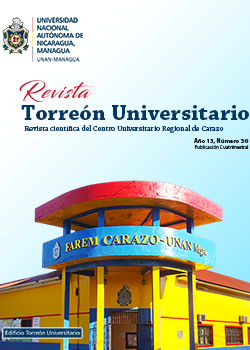The STEAM Methodology and PBL in the Integration of Knowledge and Development of Mathematics Competencies
DOI:
https://doi.org/10.5377/rtu.v13i38.19354Keywords:
STEAM methodology, Project-Based Learning (PBL), mathematical competencies, contextualized learningAbstract
The development of mathematical competencies in high school students is currently a challenge. To overcome it, teachers implement various methodologies and strategies aimed at making the knowledge of this discipline more accessible. In this regard, the present research analyzes the effectiveness of the STEAM methodology (Science, Technology, Engineering, Arts, Mathematics) and Project-Based Learning (PBL) in the development of mathematical competencies in eleventh-grade high school students. The main objective was to evaluate how the STEAM and PBL methodologies promote mathematics learning and the development of skills such as critical thinking, creativity, and teamwork. The research followed a non-experimental design, with a mixed-methods approach, mostly quantitative, at a descriptive, cross-sectional level. A survey was conducted with a sample of 17 eleventh-grade students from the Santa Teresa National Institute, along with interviews with two Physics and Mathematics teachers. This was carried out during the second semester of 2023. The results reveal that students positively value the integration of disciplines and the practical application of mathematics, showing significant improvements in their understanding of mathematical concepts. Additionally, collaboration in STEAM and PBL projects strengthened teamwork skills, although a need for greater variety in practical projects was identified.
Downloads
References
Almeida, G. V. (2015). Algunas reflexiones sobre el enfoque mixto de la investigación pedagógica en el contexto cubano. Revista Universidad y Sociedad.
Andini, Dwi, Rachmawati., Dadang, Juandi. (2002). Systematic literature review: The role of stem approaches to improve mathematical ability. Math Didactic. Jurnal Pendidikan Matematika, 8(3):236-248. https://doi.org/10.33654/math.v8i3.1955
Angel, C. H., Tomás, R., Piedad, T., & Maria, P. V. (2023). De Steam Engine a la educación STEAM: una experiencia con profesores de matemáticas en formación. Matemáticas,. https://doi.org/doi: 10.3390/matemáticas11020473
Bakemen, R., & Gottman, J. (1989). Observación de la interacción.
Benites, S. C., & Barzallo, S. A. (16 de julio de 2019). STEAM como enfoque interdisciplinario e inclusivo para desarrollar las potencialidades y competencias actuales. Identidad Bolivariana. https://doi.org/https://doi.org/10.37611/IB0ol01-12
Byrne, A. L. (2023). Diseño de un proyecto STEAM, una propuesta desde las matemáticas. Revista peruana de investigación e innovación educativa, 3(2). https://doi.org/https://orcid.org/0000-0003-3703-1049
Castillo-Castillo, K. I., Hernández-Meza, G. A., & Herrera-Castrillo, C. J. (2023). Estado del arte de investigaciones referente a Física Clásica y Moderna en el Período 2016 – 2021. Educación Superior, 22(35), 65–83. https://doi.org/10.56918/es.2023.i35.pp65-83
Gabriel Agudelo, M. A. (2008). Diseños de investigación experimental y no-experimental. Ciencias Sociales.
González, M. H., & Abarca, M. E. (2020). La metodología STEAM aplicada en el desarrollo de competencias y la resolución de problemas. Una nueva mirada en la mediación pedagógica al encuentro con el sentido del aprendizaje en los procesos educativos. ll Congreso Internacional de Educación:(105).
Hernán Feria Avila, M. R. (2019). La dimensión metodológica del diseño de la investigación científica. Cuba: Editorial Académica Universitaria (Edacun).
Herrera, C. J. (Junio de 2023). Impacto del proyecto para el aprendizaje amigable de matemática en educación secundaria. Revista Electrónica de Conocimientos, Saberes y Prácticas, 5(1), 11-28. https://doi.org/10.5377/recsp.v6i1.15475
Lourdes Cilleruelo, A. Z. (2014). Una aproximación a la Educación STEAM. Prácticas educativas en la encrucijada arte, ciencia y tecnología . Jornadas de Psicodidáctica, 15.
Mejía, R. O., & García-Vera, C. E. (2020). Metodología STEAM y su uso en Matemáticas para estudiantes de bachillerato en tiempos de pandemia Covid-19. Dominio de la Ciencia., 6(2). https://doi.org/DOI: http://dx.doi.org/10.23857/dc.v6i3.1212
Olvera, M. d., Rodríguez, A. V., & Marcos Campos Nava, A. A. (Diciembre de 2022). El enfoque STEM y el aprendizaje de las matemáticas. Revista Iberoamericana de Educacion Matematica, 18(66), 1-17. Obtenido de http://revistaunion.org/index.php/UNION/article/view/1423
Omar, A. P.-G.-M. (2022). Qualitative research in education. International Journal of Educational Research and Innovation, 278-295. https://doi.org/10.46661/ijeri.5917
Osuna, P. M., Ruiz, M. A., Ortega, M. A., & Salas, B. V. (Mayo-Agosto de 2019). Retos de ingeniería: enfoque educativo STEM+A en la revolución industrial 4.0. Innovación Educativa, 19(80), 15-32. Obtenido de https://www.redalyc.org/articulo.oa?id=179462794002
Sampieri, R. F. (2014). Definiciones de los enfoques cuantitativo y cualitativo, sus similitudes y diferencias. RH Sampieri, Metodología de la Investivación, 22.
Samsul, P. D. (2022). The Effect of STEAM in Mathematics Learning on XXI st Century Skills. A Systematic Literature Reviews. Prisma. https://doi.org/doi: 10.35194/jp.v11i1.2039
Tomalá-Vera, V. V. (Junio de 2024). La metodología STEAM y su aporte en el aprendizaje matemático. Revista Electrónica de Ciencias de la Educación, Humanidades, Artes y Bellas Artes, VII(13). https://doi.org/https://doi.org/10.35381/e.k.v7i13.3215
Vázquez Martínez, M. G. (2017). Muestreo probabilístico y no probabilístico. Aoxaca, Mexico: Universidad del Istmo.
Downloads
Published
Issue
Section
License
Copyright (c) 2024 National Autonomous University of Nicaragua, Managua

This work is licensed under a Creative Commons Attribution-NonCommercial-NoDerivatives 4.0 International License.
The authors who publish in this journal agree to the following terms.
- The author or authors of the articles, essays or research grant the National Autonomous University of Nicaragua, Managua (UNAN-Managua) the editing rights (copyright) of the submitted work, therefore the University has the exclusive right to publish the article for the entire copyright period.
- These copyrights/authors authorize Torreón Universitario Magazine and the University to edit and disseminate/publish the article in said Magazine, including printed and electronic reproduction, storage, retrieval and any other type of publication, and sources of secondary information as services. of summaries and databases, they also empower it to protect the article against unauthorized use for dissemination by printed or electronic media (PDF, HTML, EPUB, XML or others).
License for use of content
The magazine uses the Creative Commons Attribution-NonCommercial-NoDerivs 4.0 International License.
Under this statement:

This journal is licensed under a Creative Commons Attribution-NonCommercial-NoDerivatives 4.0 International License. It can be copied, distributed and transmitted publicly as long as the author and source are cited (Revista Torreón Universitario), it should not be modified or used for any commercial purpose. The full license can be found at http://creativecommons.org/licenses/by-nc-nd/4.0/.



